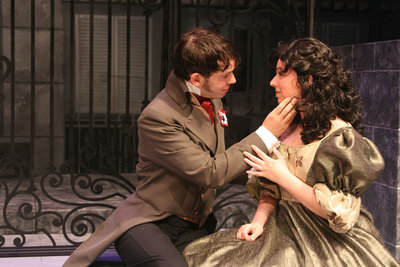
Let’s be real: At least 80 percent of the time, taking on a production of Les Misérables is a bad idea. “Ambitious” doesn’t begin to describe this excruciatingly melodramatic 1,500-page historical novel-turned-stage musical.
Many a non-professional theater has “taken a chance” on the epic French Revolution story and ended up with three straight hours of nothing but strained, yell-like singing and fake blood — in fact, it’s assumed the bragging rights awarded for overcoming Les Misérables’ technical challenges are the real reason to produce the show.
The challenge, then, becomes producing the musical in such a way as to distract the audience from how damn hard it is, and this is (surprise, surprise) the hardest part.
It’s not necessarily expected that Cottage Theatre be an exception to the “bad idea” rule — and in some ways, they’re not. The surprise, however, is how many things Cottage gets right.
The production does fall victim to number one of many potential roadblocks: the initial task of casting. Les Mis incorporates more than 30 named characters — none of which is without a nearly impossible vocal solo.
Kory Weimer, as young, heartfelt revolutionary Marius, was insecure in several vocal passages. Mandy Rose Nichols, playing Marius’ ardent and unrequited admirer Eponine, did a similarly passable job; of the leads, these two were the shakiest, often relying on pop-ish glides between notes to stay in tune and unable to keep their faces from betraying their level of effort.
What’s remarkable, though, is that these were the only two prominent performances that didn’t quite land. Patriarchal lead Jean Valjean, for instance, is one of the most difficult and coveted roles in musical theater history, and Lanny Mitchell’s acting as Valjean was both intimate and commanding, accompanied by vocals soaked in pathos and a tasteful soul-spin added on top of flawless tuning.
Tracy Nygard, as suffering single mother Fantine, was an equally breathtaking voice. Where Mitchell took a more contemporary approach, Nygard showed off her formidable operatic skill — her rendition of “I Dreamed a Dream” sounded not only ethereally effortless but emotionally authentic.
The quality of the chorus ensemble (generally number two on the list of this show’s pitfalls) didn’t smack one bit of “community theater” either. Les Misérables is, after all, a story of society en masse rising up and proving its strength and, with every “pretend-to-be-talking-to-each-other-in-public” scene, this ensemble proved it was no less vital than the leads. Ensemble acting was at times more convincing than lead acting.
Watching this production is a transcendent experience of the story and its full-bodied characters — not bad for a show in which everyone’s secretly waiting for something to go wrong.
Les Misérables plays through May 3 at Cottage Theatre, 700 Village Dr., Cottage Grove; $22-$26, tickets at 942-8001.